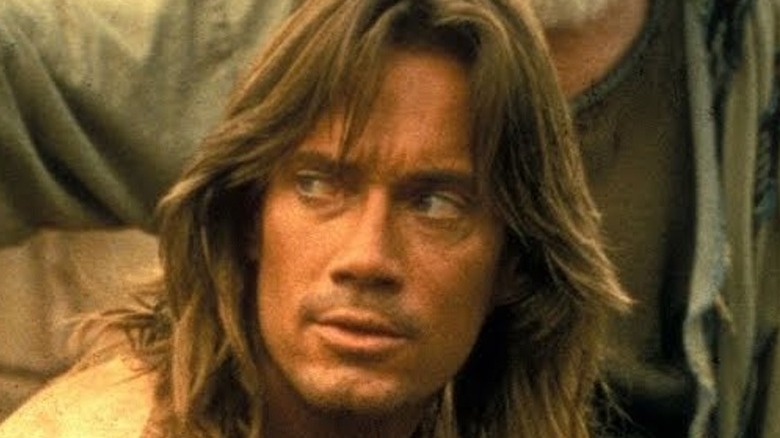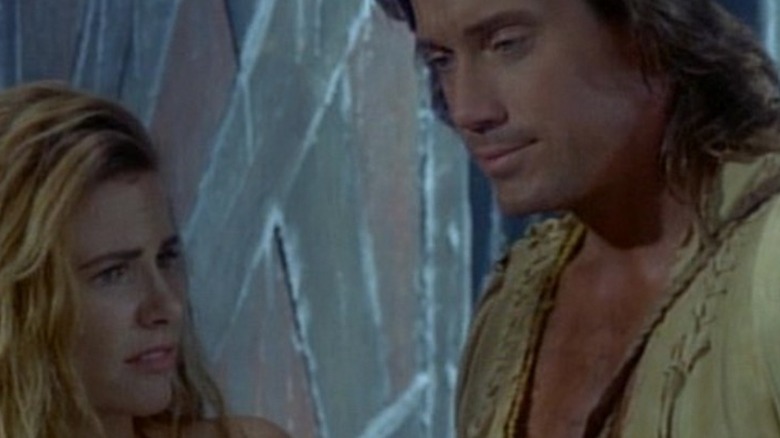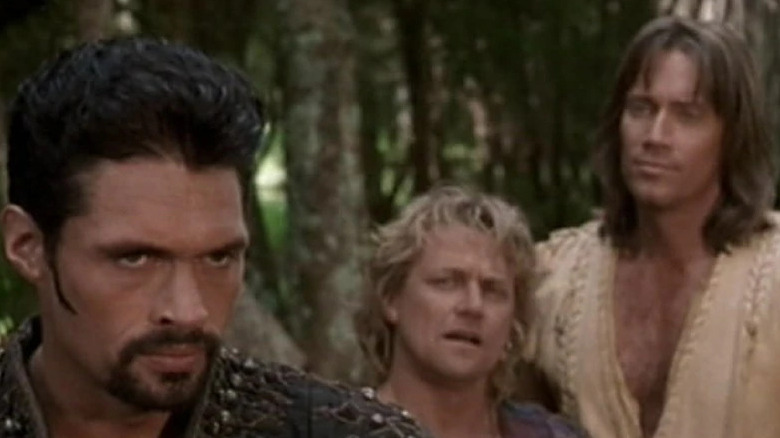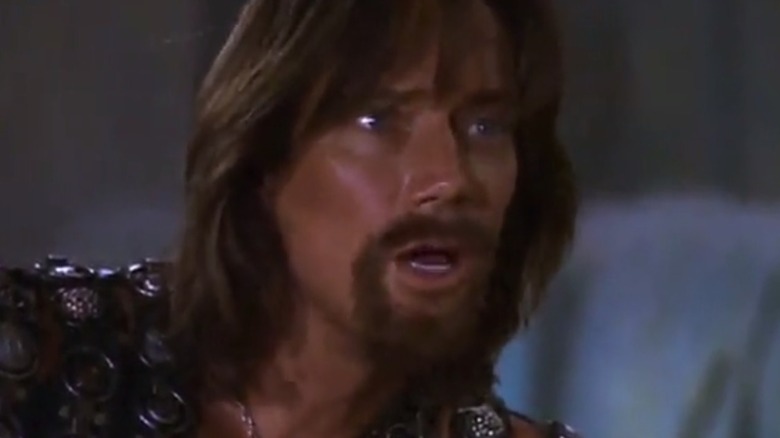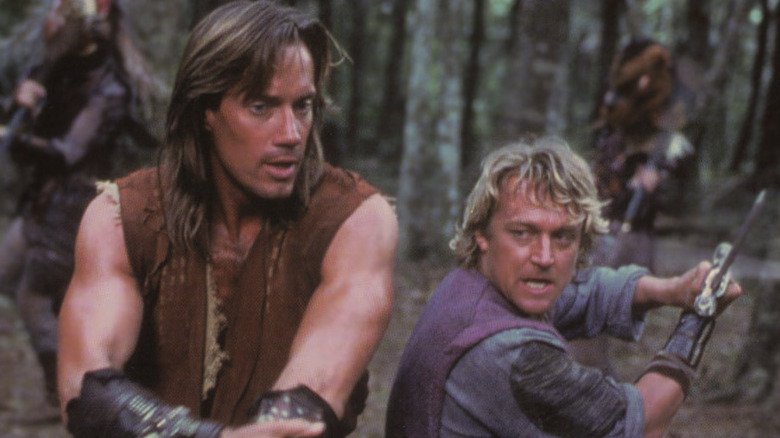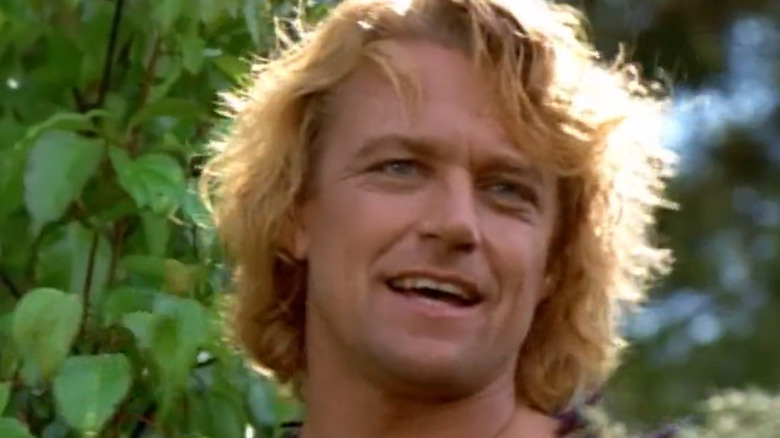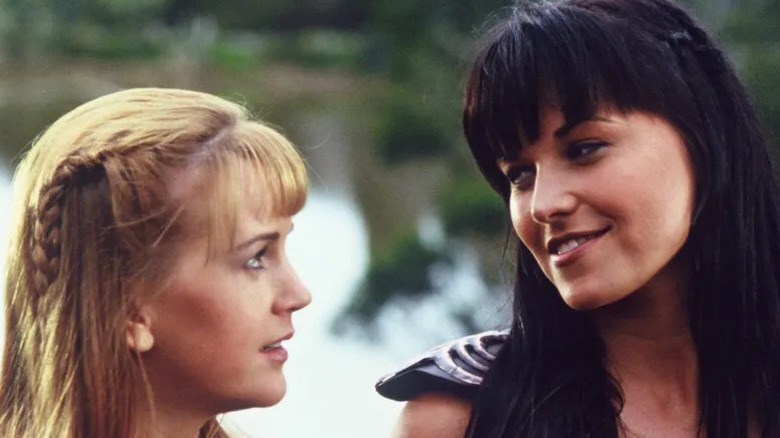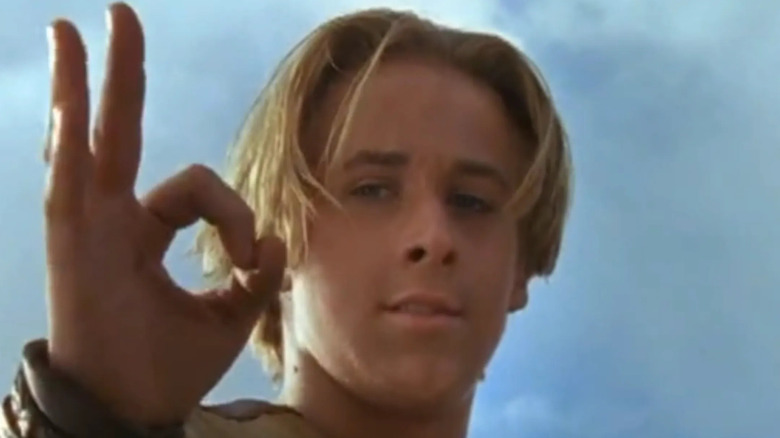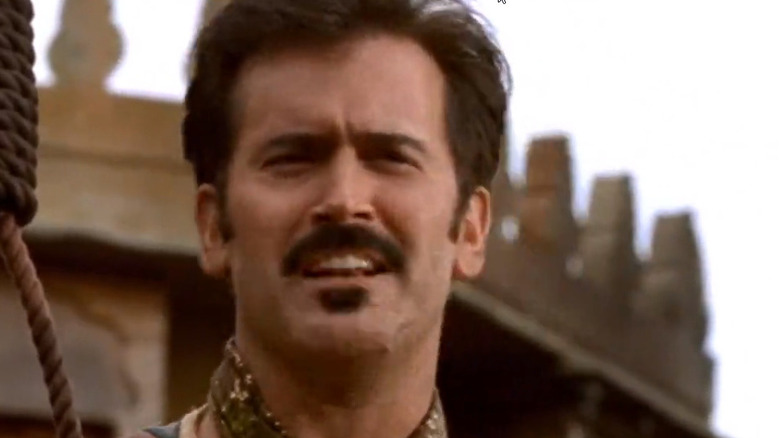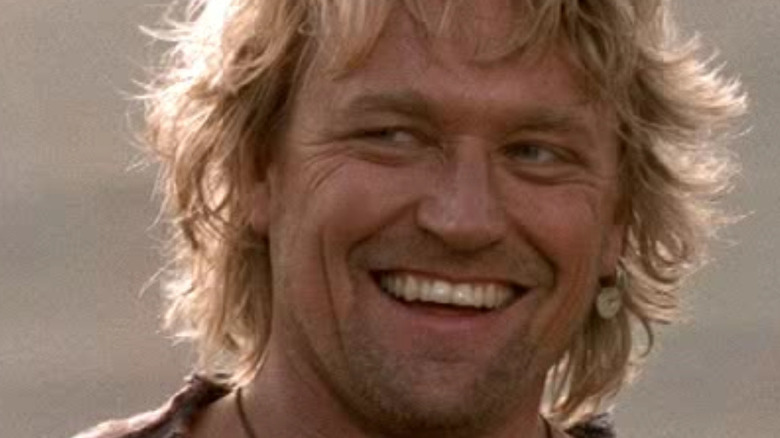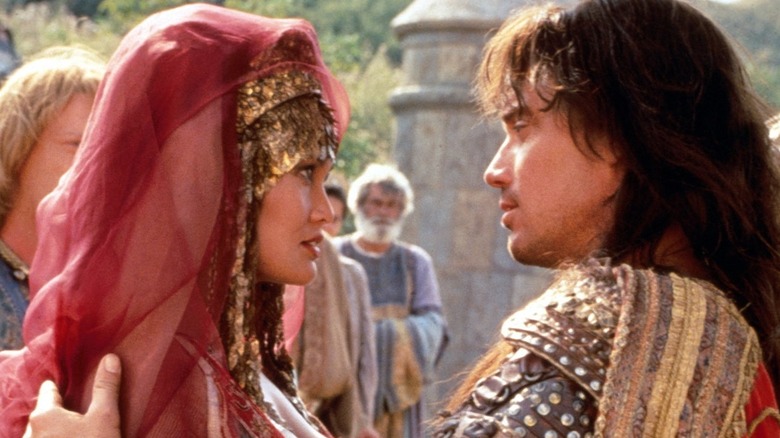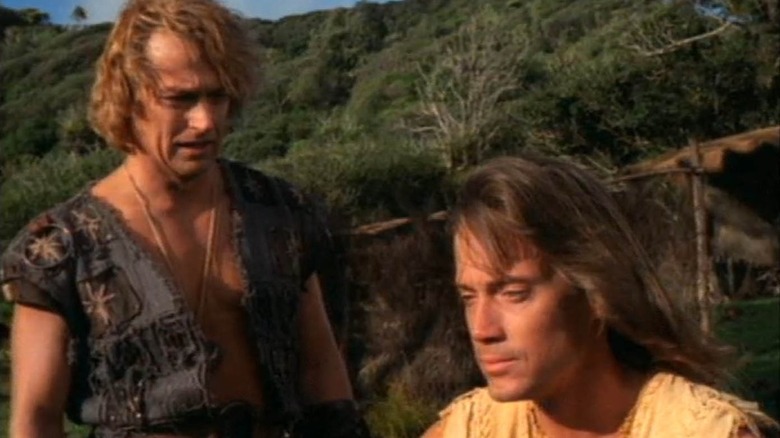The Untold Truth Of Hercules: The Legendary Journeys
This is the story of a time long ago, a time of myth and legend, when the ancient gods were petty and cruel, and they plagued mankind with suffering. Only one man dared to challenge their power: Hercules!
While today, "Hercules: The Legendary Journeys" is often remembered for being surpassed by its best-known spinoff, "Xena: Warrior Princess," the show cleaned up in the ratings department and successfully introduced many of the characters that would go on to make "Xena" the hit that it was — including Xena herself. "The Legendary Journeys" laid an epic foundation to work from by world-building a mythology-inspired landscape with sensibilities to suit a mid-'90s audience, and the rest, as they say, is history.
The Hercules of "The Legendary Journeys" was a sensitive everyman who fought for the common people against his father Zeus. Raised by his human mother Alcmene, he tried to settle down a lead a normal life before Zeus' wife Hera incited the events that would lead to the tragic deaths of Hercules' wife and children. Angry but righteous, Hercules traveled the land with his best friend Iolaus, righting wrongs and saving the innocent. Though the gods were cruel, Zeus favored and admired Hercules, and that set us up for some A+ television drama that more often than not still holds up today. And even after all these years, chances are there are plenty of things you don't know about "Hercules: The Legendary Journeys."
It started as a series of made-for-TV films
Before the 1995 debut of "Hercules: The Legendary Journeys," there was a series of made-for-TV films, including "Hercules and the Amazon Women," "Hercules and the Lost Kingdom," "Hercules and the Circle of Fire," "Hercules in the Underworld," and "Hercules in the Maze of the Minotaur." This was part of the Universal Action Pack, which also adapted William Shatner's "TekWar" novel series and later saw the birth of a handful of forgotten greats of late 1990s TV including "Jack of All Trades" starring Bruce Campbell and "Cleopatra 2525" starring Gina Torres. Rather than debuting via individual networks, these releases were syndicated across a patchwork of regional outlets.
This will make very little sense to the viewers of today, who've become accustomed to the streaming landscape in which content is almost always centralized to specific networks, but in the mid-1990s, syndicating to individual TV stations to fill specific time slots was a move that was predicted to change the television landscape forever. Other massively popular series had paved the way for this approach beforehand, including "Star Trek: The Next Generation" and "Baywatch," but the Action Pack specifically benefited from the need of independent stations to provide original programming. These low-budget fantasy and sci-fi productions were successful in no small part due to the unique utility they provided to audiences and networks alike. The Action Pack was discontinued in 2001, but it had a good run.
Hercules was a ratings monster
To say that "The Legendary Journeys" was a surprise hit is no exaggeration, and it helped bring the realm of ancient mythology to the small screen in ways that had never occurred before. The classic "Hercules" films remain wildly enjoyable for the most part, but there's no disputing that this was a starkly different take on the character. Throwing out the flowery dialogue of old and modernizing the story clicked with 1990s audiences. For most of its run, it went head-to-head in the ratings with other syndicated megahits like "Baywatch."
Competitive shows like "Sinbad" and "Tarzan" would quickly attempt to replicate the success of "Hercules," but they didn't fare nearly as well. The reasons for this failure are up for debate, but it might just boil down to the fact that the star power, unique charisma, tongue-in-cheek humor, and exciting fight scenes all just pulled together to make "Hercules" something truly special. In the end, the success of the show might be due to the virtue of its creators making bold choices in updating old material and never being afraid to take chances, making a whole new mythology out of tales as old as time.
Many of the show's stars played multiple roles
A tried and true practice of the "Xena" and "Hercules" series is that they made a humorous habit of recasting the same actors in different roles. This includes the main "Hercules" characters, Hercules and Iolaus. Besides starring as Hercules, Kevin Sorbo played Sovereign, the despotic goatee-wearing alternate universe version of himself, while Michael Hurst played an impressive seven other roles besides his turn as Hercules' best friend and traveling buddy. Likewise, actor Kevin Smith is well-known for his turn as Hercules's charismatic but highly bratty brother Ares, but he also played Bacchus and Hercules' other, human brother Iphicles.
Though today most people probably know him best for starring as Butcher in "The Boys," some of Karl Urban's earliest roles were on "Hercules," "Xena," and the made-for-TV movie "Amazon High," where he played Mael, Kor, Cupid, and Julius Caesar. The actor who likely set the record for the most roles throughout the Xenaverse is Ted Raimi, brother of producer Sam Raimi, who clocked in at no less than nine parts total, perhaps the most famous among them being the bumbling but good-hearted Joxer from "Xena." Still, impressive though those nine roles may be, there were plenty of actors that were nearly as busy as Raimi, with Lucy Lawless only losing out on a technicality because one of her nine roles between the many series was a version of herself.
Hercules the American football hero
Though the series was very much based in mythology and the classic Hercules films, the writers and producers behind "Hercules: The Legendary Journeys" wanted to reimagine Hercules as a Joe Montana-style all-American everyman. In the words of Sam Raimi in a 1995 interview with Florida's Sun Sentinel, "We didn't want to have the gods looking into pools of mists and staring down from Mount Olympus. We decided to make Hercules an American and a regular guy who wasn't necessarily a muscle-head."
The vibe of Hercules as a chill dude you could snag a beer with is indeed a major part of what makes the series click. His irritation with the gods is ever-present, but he regularly reaches out and makes the attempt to connect with them, even when he finds them frivolous or otherwise offensive. He forms solid bonds with his sibling Aphrodite and her son Cupid. Even his intense rivalry with the his hotheaded half-brother Ares just gives Hercules the opportunity to show the world that he simply operates on a different wavelength than his famous siblings. "Xena" takes the form of a redemption arc in which she's forced to come face-to-face with her past throughout every season, while "Hercules" is a bit simpler — straight up just the story of a nice guy with a good sense of humor who loves his mom and misses his family.
Iolaus, the Shakespearean actor
The relationship between Xena and Gabrielle is timeless and their love will no doubt be the subject of conversation (and fan fiction) for many decades to come. While their bond perhaps hasn't proved quite as fascinating for the fanbase, Hercules had a lifelong best friend in Iolaus who stood by him through thick and thin, and that dynamic played a big role in building his character. Behind the scenes, Michael Hurst, the actor who played Iolaus, was a well-known theatrical talent in New Zealand, praised for his turns as "fool" and "bard" characters in productions of Shakespeare's plays. Bringing that skill to "Hercules," Iolaus was one of the series' fan favorite characters throughout its run, a popularity reaffirmed when he later appeared (played by Dean O'Gorman) in the "Young Hercules" spinoff series.
Hurst has never fully stopped working as an actor, but today he's arguably better known for his work as a director. Jumping behind the camera on "Hercules," "Young Hercules," and "Xena," he has more recently added to that side of his resume as the director of "Spartacus" and "Ash vs. Evil Dead." Still, no matter how talented he might be behind the scenes, "Hercules" fans will always remember him for his work as the charismatic Iolaus, who carried many episodes of the show and helped introduce the world to Xena when he (somewhat foolishly) fell in love with her during her full-on evil era, leading to a standoff with his best bud Herc before he came to his senses and showed Xena the door.
Speaking of Xena
When looking into which "Hercules" character might make a great focus for a spinoff, showrunner Rob Tapert noted in an interview with the fan magazine Whoosh! that Xena wasn't necessarily their first choice. In fact, they initially considered Jason of Jason and the Argonauts, as Xena was intended to die in her third appearance. The thought of an alternate universe where we only ever got three appearances from Xena might be more than a little terrifying for some viewers, but it all worked out in the end as Jason was (rightfully) deemed to be much too similar to Hercules to warrant his own series.
Xena's arc in "Hercules" instead worked to set her up for her own ongoing series, though interviews of the time show creators like Raimi and Tapert musing on how to plausibly pull off a heroic turn from one of the series' most terrifying villains. In the end, "Xena" succeeds in no small part due to her quest for redemption, but the character work done in "Hercules" is crucial for building her up to a place where she could move forward. Despite initially appearing as a dastardly foe, she quickly comes to respect Hercules and Iolaus, and even has short-lived romantic dalliances with both. In many ways, without Hercules, there could be no Xena.
Xena wasn't the only Legendary Journeys spinoff
One of Ryan Gosling's earliest roles saw him landing the lead in the "Young Hercules" spinoff, which explored the teen adventures of the title character and Iolaus. The central characters' ambitions and personalities remain very much the same as they would be in the original "adult" version, but the emphasis is on Ares, Strife, and Discord attempting to undermine the young Herc in order to get into Zeus' good graces (which, of course, never worked). Though "Young Hercules" lasted only a single season, this was in the days of the mega-season, which means the series actually aired a grand total of 50 episodes. Today, Gosling's star power makes the idea of him playing this character seem a little ridiculous, but looking back at "Young Hercules" makes it obvious that the kid was destined for the big time from the very start.
Besides this, there was also a two-hour pilot made for "Amazon High," which would interact with the "Young Hercules" mythos by bringing in guest stars from the show. Though the pilot never got picked up, it featured an impressively star-studded cast, with a number of classic "Xena" regulars like Danielle Cormack appearing alongside the series villain Kor, played by Karl Urban, and high school student from the future Cyane, played by none other than Selma Blair. Quite a bummer that their series wasn't picked up — hopefully those two did okay.
Bruce Campbell wasn't just a guest star
As a longtime collaborator and pal to Sam Raimi, Bruce Campbell has often discussed his friendship with Raimi dating back to babysitting Sam's younger brother Ted in his youth. After he and Raimi made horror history with "The Evil Dead" and its many sequels and spinoffs, it might not come as a surprise that he was a regular guest star throughout the Xenaverse series. Appearing as the dashing thief Autolycus, he showed up in 12 episodes of "The Legendary Journeys" and eight episodes of "Xena."
Campbell appeared on "Hercules" and "Xena" many times, but he was also a frequent director, helming seven episodes through the series run. As part of the Action Pack, he ultimately snagged a starring role in the alternative history narrative "Jack of All Trades," which remains an underrated show full of Campbell's trademark witty one-liners and bravado. Featuring a Canada ruled over by Napoleon, the series tapped into humor more than any of the other Action Pack series, but remained full of the fight scenes and acts of spontaneous heroism the lineup was known for.
No centaurs were harmed
Though neither "Hercules" or "Xena" are particularly well-known for their slapstick comedy, there were tons of humorous performances and running jokes to be found in both series. Wild disclaimers appeared in the credits throughout the shows, including references to the episodes such as "no centaurs were harmed." Dating all the way back to the first season, this was a running gag that continued throughout all seasons of the show. In addition to a number of entirely humor-based episodes like "The Green-Eyed Monster," these tagged on Easter eggs were a part of how the series let its fans celebrate the cheesiness of the show in a way that made them feel like they were in on the joke.
Highlights include Season 1's "The Vanished Dead," in which the disclaimer reads "No dogs of war were harmed during the making of this motion picture." Another episode, "Unchained Heart," features the line "No vicious beasts intent on taking over the world were harmed during the making of this motion picture." "Xena" would take this joke and run with it, making the disclaimers increasingly complex and even occasionally a bit meta, but it all started here.
Kull the Legendary Journeys
Today, Kevin Sorbo remains best known for his work on "Hercules," but he's also put his genre hero chops to work in various other roles; for example, between seasons of "Hercules," he starred in the 1997 film "Kull the Conqueror." Another Robert E. Howard creation, Kull is a barbarian hero similar to Conan. Indeed, this was initially intended to be the third "Conan" film, but was repurposed when it was confirmed that "Conan" star Arnold Schwarzenegger would not be returning for the role. It'd be a stretch to say "Kull" is a great movie, but Sorbo certainly gives it his all.
Running with the theme of starring in the slightly less famous properties of major genre writers, Sorbo also played the lead in the sci-fi series "Andromeda," based on unused material from "Star Trek" creator Gene Roddenberry's archives and produced by Roddenberry's widow Majel Barrett. Sorbo plays the captain of a ship known as the Andromeda Ascendant, Dylan Hunt, who is rescued hundreds of years after he is frozen in time. Embarking on a mission to restore civilization in the cosmos, Hunt enlists a ragtag crew. The series ran for five seasons, and while it might not be quite as fun as "Hercules," it's a neat artifact for Roddenberry megafans and anyone who enjoys the low-budget sci-fi television of the early aughts.
Saying goodbye
Like any long-running series, "Hercules" saw a number of behind-the-scenes ups and downs, and so did its stars — most notably Sorbo, who experienced extreme health issues unrelated to his work on the series during the filming of the fourth season. He had an aneurysm in 1997 and experienced three subsequent strokes, ultimately losing ten percent of his vision. Though he was forced to relearn basic things like keeping his balance, this was kept almost entirely out of the press until he wrote about it at length in his autobiography, "True Strength."
Ultimately, the series ended up being canceled during its sixth season when Sorbo didn't renew for a three-year contract and only eight episodes of the final season were produced, making it the rare series with fewer overall episodes than its spinoff — 111 to the 134 "Xena" aired. The final season doesn't fully catch its balance, perhaps due to the uncertainty behind the scenes, making it a strange leaving off point. Still, regardless of any shortcomings, "Hercules" had a heck of a run.
